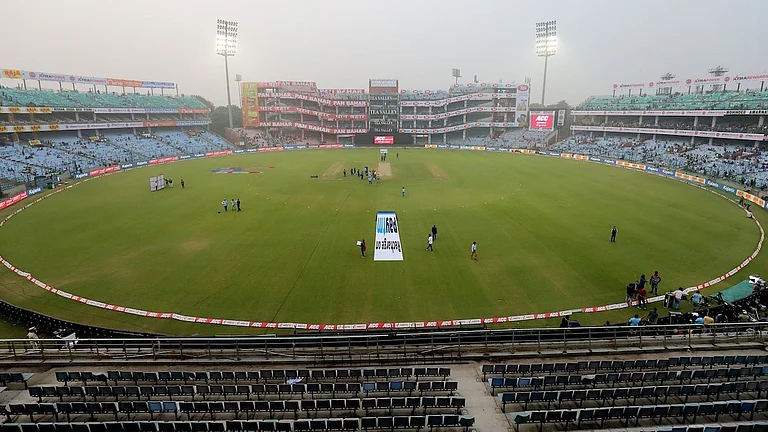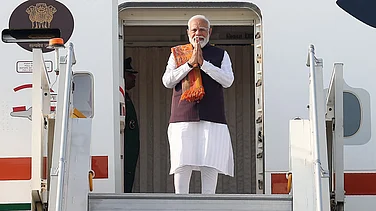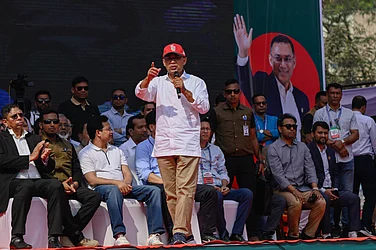Russian forces battled Wednesday to surround the Ukrainian military's last stronghold in a long-contested eastern province, as shock reverberated from a Russian airstrike on a shopping mall that killed at least 18 in the centre of the country two days earlier.
Moscow's battle to wrest the entire Donbas region from Ukraine saw Russian forces pushing toward two villages south of Lysychansk while Ukrainian troops fought to prevent their encirclement.
Britain's defense ministry said Russian forces were making "incremental advances" in their offensive to capture Lysychansk, the last city in the Luhansk province under Ukrainian control following the retreat of Ukraine's forces from the neighbouring city of Sievierodonetsk.
Russian troops and their separatist allies control 95% of Luhansk and about half of Donetsk, the two provinces that make up the mostly Russian-speaking Donbas.
The latest assessment by the Institute for the Study of War, a Washington-based think tank, said the Ukrainians were likely in a fighting withdrawal to seek more defensible positions while draining the Russian forces of manpower and resources.
Avril Haines, the U.S. director of national intelligence, said Russia "may think time is on its side" due to the escalating costs borne by the West and fatigue as the war grows longer. The most likely scenario predicted by American intelligence, Haines said, is a "grinding struggle" in which Russia consolidates its hold over southern Ukraine by the fall.
The US correctly predicted Russia would invade Ukraine in February, but was wrong in assessing that it would quickly seize Kyiv. Speaking at an event in Washington on Wednesday, Haines said Russian President Vladimir Putin "has effectively the same political goals that he had previously, which is to say that he wants to take most of Ukraine" and push it away from NATO.
"We perceive a disconnect between Putin's near-term military objectives in this area and his military's capacity, a kind of mismatch between his ambitions and what the military is able to accomplish," Haines said.
Meanwhile, crews continued to search through the rubble of the shopping mall in Kremenchuk where Ukrainian authorities say 20 people remain missing.
Ukrainian State Emergency Services press officer Svitlana Rybalko told The Associated Press that along with the 18 people killed, investigators found fragments of eight more bodies. It was not immediately clear whether that meant there were more victims. A number of survivors suffered severed limbs.
"The police cannot say for sure how many (victims) there are. So we are finding not the bodies but the fragments of bodies," Rybalko said. "Now we are clearing at the very epicentre of the blast. Here, we practically cannot find bodies as such."
Several families stood by what was left of the Amstor shopping centre Wednesday morning in hope of finding missing loved ones.
"This is pure genocide," local resident Tatiana Chernyshova said while going to lay flowers at the site. "Such things cannot happen in the 21st century."
"We need to engage everyone to help stop the war, help us fight these scum — these Russian aggressors," Chernyshova said.
Psychologists working at the site with families said they were trying to help people come to terms with their loss.
"We are trying to help them release their emotions now, as later it becomes harder and much more painful," said one psychologist, who did not give his name as he was not authorized to speak to the press.
After the attack on the mall, Ukrainian President Volodymyr Zelenskyy accused Russia of becoming a "terrorist" state. On Wednesday, he reproached NATO for not embracing or equipping his embattled country more fully.
"The open-door policy of NATO shouldn't resemble old turnstiles on Kyiv's subway, which stay open but close when you approach them until you pay," Zelenskyy told NATO leaders meeting in Madrid, speaking by video link. “Hasn't Ukraine paid enough? Hasn't our contribution to defending Europe and the entire civilization been sufficient?”
He asked for more modern artillery systems and other weapons and warned the NATO leaders they either had to provide Ukraine with the help it needed to defeat Russia or "face a delayed war between Russia and yourself."
Russian foreign ministry spokeswoman Maria Zakharova on Wednesday dismissed what she claimed was the Ukrainian government's "blatant provocation" in trying to blame the mall missile strike on Russia's military.
Britain's defense ministry said there was a "realistic possibility" that the mall strike "was intended to hit a nearby infrastructure target."
"Russian planners highly likely remain willing to accept a high level of collateral damage when they perceive military necessity in striking a target," the ministry said. "It is almost certain that Russia will continue to conduct strikes in an effort to interdict the resupplying of Ukrainian front-line forces."
Russia's military also is experiencing a shortage of more modern precision strike weapons, which is compounding civilian casualties, the British ministry said.
In southern Ukraine, a Russian missile strike on a multi-story apartment building Wednesday in Mykolaiv killed at least four people and injured five, regional governor Vitaliy Kim said.
Russia's defense ministry said in a statement that the missile strike on Mykolaiv targeted a base for training "foreign mercenaries," as well as ammunition depots.





















